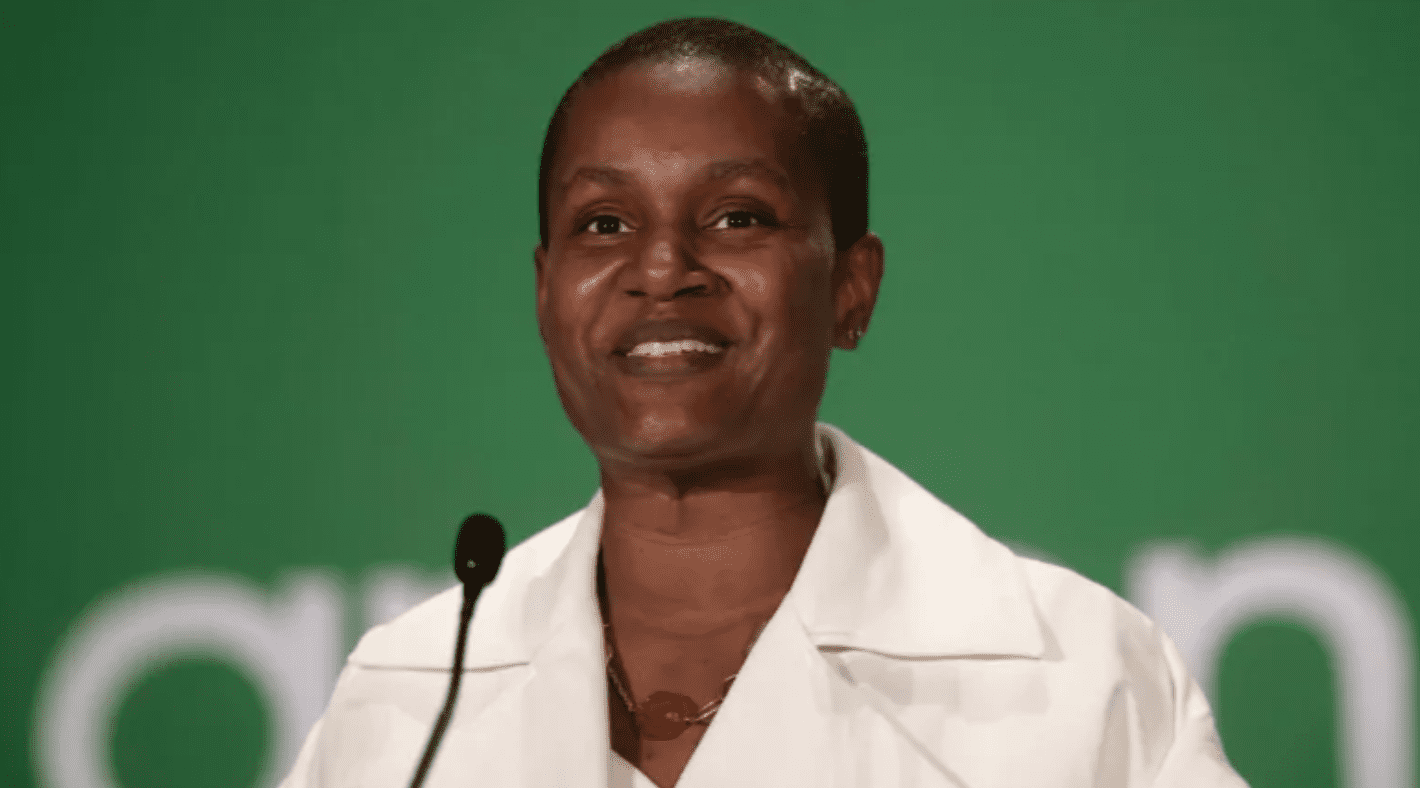Fresh off her victory in the Green party's leadership contest to replace Elizabeth May, new leader Annamie Paul is set to contest next month's federal by-election in Toronto Centre. But, to put it bluntly, she won't win, and the party urgently requires a feasible strategy for procuring their leader a seat in the House of Commons.
Since its establishment 37 years ago, the Green Party has been more accustomed to looking in at Parliament from the outside, more likely to attend the House of Commons via the public viewing galleries than as members on the floor.
That slowly changed this past decade, when Elizabeth May was finally elected in 2011. But since then, the party's parliamentary presence has increased at a glacial pace, with a caucus enlargement to three seats in 2019 considered a relative success.
The reality: last year's election result was hardly a triumph. While a minor Maritime breakthrough was worthy of celebration, a truly buoyant Green party would have acquired numerous seats in favourable Vancouver Island ridings. Instead, they emerged from the election with the same number of British Columbian seats they had already held. Seven years after a close runner-up finish in the 2012 Victoria by-election, the Greens could muster no improvement there this past autumn.
With Paul recently declared the party's new leader, it's important she enters Parliament as soon as possible. Her decision to seek such an entry through Toronto Centre is an odd one, although it's partly explained by the intertwining timelines of Liberal MP Bill Morneau's resignation and the long-running Green leadership contest.
Frankly, Toronto Centre is a no-hope riding for the Greens or any other party not named "Liberal Party of Canada". It's gone Grit every federal election for a quarter-century; more than 57 percent of riding voters opted for the Liberals last autumn. (Even the NDP has little hope of progress here: they've never held the federal seat; despite finishing second last year, they earned less than half the support of the Liberals; and although the NDP currently holds the seat provincially, that's merely an anomaly, the product of a hard-change election in which the Ontario Liberals were temporarily trounced from most ridings.)
One doesn't need to be adept at exploiting tarot cards to prognosticate that Toronto Centre isn't about to change hands.
A dozen years after Elizabeth May made the strategic mistake of ignoring her political advisors and running in her home riding of Central Nova against a then-popular federal cabinet minister, no less Paul is intent to repeat the same miscalculation by contesting an unwinnable riding as the new Green leader. While it may appear principled to spurn the temptation of becoming a parachute candidate, such virtuousness doesn't put Green butts in House of Commons seats.
May apparently expected the NDP wouldn't run against Paul in Toronto Centre after a similar favour was granted to new NDP leader Jagmeet Singh during last year's Burnaby South by-election. Perhaps May did not realize the oft-forgotten convention is to stand down when a new leader contests a seat their party recently held. (The Greens have never held Toronto Centre.)
Ultimately it doesn't matter, because even if the NDP stood down in Toronto Centre, the Greens still wouldn't come close to winning the riding. Fortress Toronto has proven indifferent to the so-called Green wave.
There has been ample criticism in recent days of Paul's controversial decision to contest the Liberal-friendly riding. She announced her candidacy for the Green leadership more than half a year before Bill Morneau resigned as MP of Toronto Centre; surely Paul knew when she agreed last month to run again in Toronto Centre that, were she to become Green leader, actually getting elected in the constituency would remain a daunting prospect.
Additionally, due to the Greens' internal conflict of interest rules, the party apparatus was not able to begin helping Paul's by-election campaign until her leadership bid had concluded, which gave the favoured Liberals an extra nine-day campaigning advantage over the Greens. (This was in addition to the head start the Liberals already enjoyed by declaring their candidate a week prior to the Greens.) Had someone not contesting the Green leadership instead become the party's candidate in Toronto Centre, the Liberals would have had less of an edge.
But to be fair to Paul, Toronto Centre is her local riding, which she contested during the general election just last year. Additionally, the Greens' candidate nomination deadline for Toronto Centre closed before the announcement of the new party leader, meaning that Paul had to choose whether to contest the by-election before the leadership result was known. And note that Paul was ultimately acclaimed as the Greens' by-election candidate in Toronto Centre; presumably no other party members were interested in running.
However, the why and the when and the how are all immaterial. We know the Greens won't win in Toronto Centre. So what do they do next if they want their new leader in Parliament?
The most obvious scenario is for outgoing leader Elizabeth May to resign her Saanich—Gulf Islands seat to allow Paul to contest it in a by-election. Asked last year around the start of the process for anointing a new Green leader, long before the outcome was known if she would do just that, "absolutely not" was May's response, stressing she was beholden to her constituents, not her party.
Okay then, how about another promising Vancouver Island seat? The Greens enjoyed two propitious finishes over the past decade in Victoria, where new NDP MP Laurel Collins doesn't yet command much of an incumbency advantage, elected just last year after first becoming a city councillor in 2018.
Esquimalt—Saanich—Sooke is another tantalizing riding, where fellow Green leadership contender David Merner ran in 2019 and earned more than 26 percent of the vote, finishing less than eight percentage points behind the winner.
What about outside of British Columbia? The Ontario Greens acquired their first seat in the provincial riding of Guelph in 2018 with 45 percent of the vote, more than double what the runner-up earned. Admittedly the federal Greens couldn't win there a year later, but rather promisingly, they did finish in second place for the first time.
Or perhaps the Maritimes, where the federal Greens pulled off a shock win in a New Brunswick constituency last autumn? The two most promising ridings in this region are arguably in Prince Edward Island, where coincidentally the provincial Greens are Official Opposition. The federal Greens earned 26.5 percent in Malpeque and 23.4 percent in Charlottetown last year both second-place finishes. The latter may be more promising as an urban riding, but it's unclear whether either constituency would be suitable for a parachute candidate, given that locals have the rather parochial habit of referring to people not born on the Island as "come from aways" (or "CFAs").
Ultimately the most important factor in where Paul should run to get elected isn't riding suitability it's timing. Elizabeth May could vacate her Saanich—Gulf Islands seat tomorrow, and the governing Liberals could only delay calling a by-election for a maximum of six months. None of the other ridings I've mentioned are likely to open ahead of the next general election, scheduled for 2023.
Time is of the essence for the new Green leader, and only Saanich—Gulf Islands presents a path for Paul into Parliament by mid-2021 at the latest.
Greens would be wise to remember that it took Elizabeth May more than five years to get elected to Parliament after becoming leader. That delay might have been acceptable a decade ago for a fringe party that had never previously elected an MP, but such a scenario today would spell doom for Paul's embryonic leadership and the Greens' ability to reinvigorate themselves.
May admitted she garnered less public enthusiasm in 2019 compared to previous election campaigns, and said she had an epiphany that the Greens required a fresh leader if the party was to re-capture the imagination of Canadians. If May is serious about supporting Paul supposedly her preferred leadership candidate and injecting the party with new energy, the outgoing leader must ensure Paul enjoys the optimum conditions for success.
There's only one way that can happen: if May offers up her Saanich—Gulf Islands seat to Paul.
Elizabeth May's actions over the next few months will illustrate not whether she prioritizes her constituents over her party, but instead whether she prioritizes her own political career above the needs of the Greens and their fledgling new leader.
Photo Credit: CBC News






